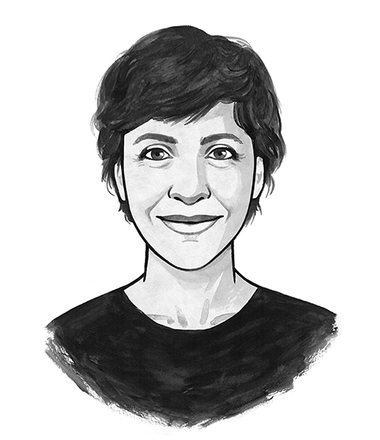At The Correspondent, we’re spending more time learning about how we can have better conversations about our toughest issues.
Some weeks ago, we brought together experts in reproductive rights and others who work on dialogue and peaceful communication. We didn’t know quite what to expect, with 16 people sharing their thoughts from 13 different countries. This is because the topic we asked our experts to look at has seen an overwhelming number of people and policymakers clashing around the world.
The legal right of a person to access a termination of their pregnancy is as political and polarising an issue you can get. Lawyers, activists, writers and dialogue facilitators joined us to discuss five ways to talk about one of our toughest issues: abortion.
Here were the five main takeaways.
- Be aware of what's out of your control: influence and misinformation
- Look to Ireland, Argentina and Poland to see how citizens have led
- Remember who you’re talking about when you're talking about abortion
- There is a clear way to break the taboo around sexuality and patriarchy: education
- It’s OK to not agree. Here are some tips for making space for difficult conversations
1. Be aware of what’s out of your control: influence and misinformation
In the recent US elections, abortion was a single-issue vote for many citizens at the ballot boxes. The shadow of the US Supreme Court looms large over abortion as a constitutional right. "America’s new era of abortion politics," as US news media called it, is indeed a global era of abortion politics.
When trying to talk about our toughest issues, it is good to keep the wider context in mind. In late October, the US joined a group of authoritarian countries in a non-binding international anti-abortion declaration. It followed years of banning US-funded organisations from providing or discussing abortion worldwide. Fundamentalist organisations are also trying to restrict women’s rights, especially from the US and Russia. “Discussions about abortion belong to much bigger debates around patriarchy, gender roles, the secular state, democracy, and individualism,” says Liliana Religa, an activist from the oldest organisation working on reproductive rights in Poland.
2. Look to Ireland, Argentina and Poland to see how citizens have led
In Australia, the last state has now decriminalised abortion; and in New Zealand or South Korea, abortion bans are in the process of being partially overturned.
In Argentina, Ireland, and Poland – three staunch Catholic countries – citizens have demanded (and in some cases obtained) a change in policies which infringe upon their rights.
Ireland lifted its de facto abortion ban on 1 January 2019 after a citizens’ assembly and referendum backed radical change. And so the "infrastructure" for change "was built at a grassroots level” explains journalist Una Mullally. Mullally describes two other "pillars" for change. One was the citizen assembly’s precursor, the "constitutional convention". "It assembled citizens to discuss complex topics, hear from experts and vested interests, and make recommendations to the government."
The third and final pillar to effect change – "a long-established feminist-led pro-choice protest and activist movement” – has also been vital in Mexico, says Erika Yamada Kubo. It has been key to Argentinians’ success in pushing for a bill to legalise abortion. Sabrina Cartabia, a prominent lawyer, explains that when MPs formed an alliance in Congress in 2017, it was a "powerful articulation that allowed [for the] abortion debate in 2018". Citizens watched the debate broadcast live; they also added their own arguments "on health, autonomy and human rights," says Cartabia. "The taboo was put aside, with a growing interest from society, the political class and the media.”
3. Remember who you’re talking about when you’re talking about abortion
"Everyone Loves Someone Who Had An Abortion."
A slogan like this shows that one way to transcend ideology is to bring it back down to the people directly affected by policies. We Testify, a US organisation representing people who have abortions, shares their stories at the intersection of race, class, and gender identity. It shifts the conversation, says founder Renee Bracey Sherman, "and helped people better understand that abortion is common (one in four cisgender women will have one), and that they love someone who had an abortion.”
In Poland, Liliana Religa describes the authenticity created by "initiatives, inspired by #ShoutYourAbortion, that intend to create safe spaces where people, usually anonymously, can tell their stories".
Dione Mabunda shared her own horrific story of a miscarriage. Despite being in one of the best urban hospitals in Maputo, she was mistreated by staff and not given painkillers. And yet abortion is legal in Mozambique. “Having experienced first hand what I experienced ... it is difficult to me to consider abortion safe and to think that women will feel encouraged to use the services,” says Dione.
When you’re talking about tough issues, humanise the issue. Depoliticise the issue. Focus on those who may need the service. Don’t focus on the polarised extremes of the debate. Rosebell Kagumire, Ugandan writer and campaigner, says "normalising something – however socially opposed – remains primarily the experience of the person who gets pregnant."
Language is key. The Argentinian consejerías, or advisory centres, provide information “in simple language and without judging the reasons,” says Sabrina Cartabia. “For many years the abortion debate was blocked because the discussion was reduced to narratives that equated abortion with killing children."
This shift in the narrative is necessary in order to find more common grounds with those you are talking to. Miki Kashtan, co-founder of Bay Area Nonviolent Communication, points out that “the language of ‘rights’ is much less conducive to people coming together than the language of ‘needs’”.
People with unwanted pregnancies simply need access, says British-Australian journalist Megan Clement, who has reported on the issue all around the world. “Where access is lacking, they need the networks that will grant them access to the services they need, either via medical abortions secured online or via travelling for surgical abortions.”
For Paul Vittles, who specialises in the fields of community engagement, participatory democracy and facilitating transformational change, we need to bring difficult debates down to the personal sphere. “At any point in time, somewhere in the world, someone is wanting to change something,” says Paul. “We often brand it as ‘politics’ but it’s basically everyday change dynamics and human interaction, just on a larger scale, involving more people.”
4. There is a clear way to break the taboo around sexuality and patriarchy: education
There’s probably not “a country on earth where abortion and reproductive rights are not taboo,” says Megan Clement.
While we’ve heard examples of societies where shame around sexuality comes from religion, there are also the factors of colonialism and a lack of funding for sexual education to consider.
Amanda Marufu, a writer and activist from Zimbabwe, was contacted by a relative of a former partner who was "bleeding in her dorm room", and this was only because " I was the only open minded person she could think of". As in the US, the disinvestment in sexual health education means that “people feel shame and are shamed for talking about their bodies, asking questions about their sexuality, or reaching out for help if they need it,” says Renee Bracey Sherman, the US campaigner. As one Argentine slogan goes: "Sexual education to decide, contraceptives to prevent abortion, legal abortion to prevent death.”
Rosebell Kagumire, the Ugandan editor of AfricanFeminism.com, frames the taboo within the consequences of colonial constructs. “The struggle to keep controls on women’s fertility, sexuality, bodies playing in national theatres – parliament is tied to the destruction of systems that allowed women to be experts at their own lives,” says Rosebell. “In rural communities and traditionally, conception and birth is an arena women are seen as expert [in], but colonial structures refuse to acknowledge that and insist on an institutionalised take on decisions that are deeply private to women.”
The taboo of how sex is viewed socially (to have children) has to be broken “for women to actually start speaking [up] for their right to make this choice and use contraception," says Ethiopian activist Aklile Solomon Abate, "irrespective of their marital status”.
Less shame and less fear mean more lives could be saved. Njoki Ngumi is a non-medical practitioner in Kenya, who says parents play a big role in this literacy. “So when you ask young women why they never asked for help they are scared ... of their parents who simply choose to kick them out or simply not talk to them at all," says Amanda Marufu from Zimbabwe. "And even more so scared of what society will say.”
5. It’s OK to not agree. Here are some tips on making space for difficult conversations
Social media is not the optimal space to have the difficult conversations with people we disagree with. Una Mullally says this is necessary to create this space. “Door-to-door canvassing has been so important in Ireland during referendum campaigns on so-called ‘divisive’ issues,” she adds, “as it instigates thousands of face to face conversations with strangers who might disagree with you. We have to be willing to approach conversations from a standpoint of listening, informing, and educating, not merely ‘winning’.”
Una saw first-hand how important it is to acknowledge that “ideologies exist, strong opinions exist, heightened emotions exist. Those are realities and they have to be acknowledged, or else one runs the risk of people feeling sidelined or unheard.”
In Uganda, activists discuss the legalisation of abortion as a way to reduce maternal mortality. “It is a tactical way to initiate dialogue in the very conservative Ugandan community,” says Primah Kwagala.
And carefully framing the narrative matters whether you’re discussing abortion or homosexuality in Kenya, or rape in Zambia.
Change is possible. Jo Berry started a dialogue with Patrick Magee, the ex-IRA combatant who planted the bomb which killed her father. “I met him, not to blame or demonise him but to listen and understand. I wanted to experience his humanity,” says Jo. “He changed during the meeting, saying later he was disarmed by my empathy. Being able to listen to our enemy is crucial to creating a peaceful world, for that we need to go beyond labels and hear the story.”
Una Mullally saw how this worked for Ireland. "The issue has to be grounded in empathy, rather than legal or religious arguments," says the host of the Don’t Stop Repealin podcast.
With many thanks to Patrick Chalmers, Rosebell Kagumire, Megan Clement, Sabrina Cartabia, Ann Kay Holland, Jo Berry, Primah Kwagala, Una Mullally, Amanda Marufu, Paul Vittles, Miki Kashtan, Dione Mabunda, Renee Bracey Sherman, Aklile Solomon Abate, Erika Yamada Kubo, Liliana Religa, Eka Imerlishvili, Jessica Bateman, Mageda Esolyo and Njoki Ngumi.



